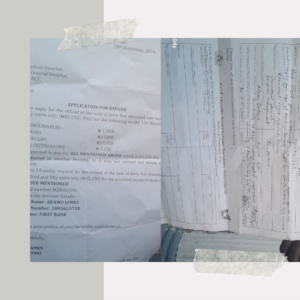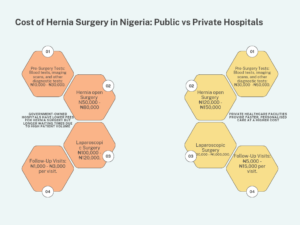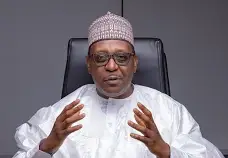In the brightly lit corridors of Bwari General Hospital, a silent battle unfolds every day. Here, among the tired walls and neatly lined chairs, lives a young father whose hopes for medical relief have been crushed by the very system that was supposed to heal him. Adamu, a 32-year-old security guard and father of two, has fought a quiet, but relentless battle against a recurrent inguinal hernia that has haunted him for years. But his story is not just one of physical pain—it is a tale of unspoken suffering, frustration, and the crushing weight of a broken healthcare system that is failing those who need it most.
Africa Health Report (AHR) correspondent Gom Mirian, who visited the facility, highlighted the stark reality faced by many Nigerians like Adamu. With no means to afford the high cost of private healthcare, he turned to the public hospital, where long lines, overcrowded wards, and a lack of basic amenities are daily realities. Unfortunately, Adamu’s experience is all too common for millions of Nigerians, who are stuck in a healthcare system that offers neither the answers nor the care they desperately need.

The Agony of Waiting
The pain had been gnawing at Adamu’s body for months. For years, he had lived with the memory of his hernia surgery as a young child—a distant hope that it would never resurface. But life, it seemed, had other plans. The swelling returned.
The discomfort worsened. And so, after years of quiet endurance, Adamu knew it was time to seek help. The only place he could turn to was Bwari General Hospital, located in a quiet corner of Nigeria’s bustling capital, Abuja. The decision was not easy—it was borne out of necessity, not choice.
“I had no other option,” Adamu recalls, his voice heavy with frustration. “I couldn’t afford the private clinics. I thought the government hospital would help me. But it hasn’t.”
Last year, after months of unbearable pain, Adamu made the difficult journey to the hospital, his body aching with each step.
He was diagnosed with a hernia, just as he feared, and doctors advised him to undergo surgery. The news was a bitter pill to swallow, but Adamu felt a sense of relief. At least, he thought, this would be the end of his suffering.
But relief was fleeting. The hospital told him that the surgery would need to be scheduled, and he would have to wait. The weight of the uncertainty hung over him, but Adamu, a father who works tirelessly as a security guard, knew he would have to find the funds before the surgery could be performed. And so, he waited.
The Empty Promises
In November 2024, after saving what he could from his meager wages, Adamu returned to the hospital, ready for the surgery that would finally free him from his pain. His surgery was scheduled for November 13th. But when he arrived at the hospital, nothing went as planned.
“They told me to come the night before to prepare for the surgery,” Adamu says. “But when I got there, all they did was check my blood pressure. They told me to wait for a few hours. I thought maybe they were just getting ready, but no one told me anything. I kept waiting. And waiting.”
Hours passed. No word. No updates. Just the overwhelming sense of helplessness that comes with being left in the dark. And then, when he woke up the following day, he was hit with more disappointment.
“The doctor was on strike,” Adamu recalls, his voice thick with disbelief. “They told me to come back next week. I had spent so much money just on transportation—sometimes I even walked to save money—and now I was being sent away again.”
The frustration that Adamu felt was not just about the delayed surgery. It was about the lack of communication, the silence that enveloped him as he waited for a procedure that he had been promised for so long.
In a system where information is scarce, and patients are left to figure things out on their own, Adamu’s situation was far from unique.
A Turn for the Worse
Adamu’s anguish took a darker turn the following week when he returned to the hospital for his rescheduled surgery. The doctor who had been overseeing his case saw him, but instead of offering the care he so desperately needed, he delivered crushing news.
“He took me into his office,” Adamu recalls, his voice shaking. “He told me that he would no longer perform my surgery, explaining that I attempted to report him. He said I should go elsewhere. He gave me a referral to Gwagwalada Teaching Hospital. But for no reason. No explanation. Just ‘go.’”

Adamu holding his referral note and application for his refund of money on 28/11/2024 in Abuja (Photo Credit: Gom Mirian/AHR).
The referral was cold, impersonal, and final. No care for the pain Adamu was in. No attempt to offer reassurance. Just a stark command to go somewhere else. Adamu was left reeling, struggling to understand why this was happening to him.
“I don’t know what I did wrong,” Adamu says, his eyes welling up with tears. “I was only trying to get better. I’m in serious pain, and now I have to travel to another hospital. It’s not fair, is it because I’m a common security man, so I don’t deserve to live?” he asked, wiping his face in shame. In that moment, Adamu was not just a patient—he was a father, a man with hopes and dreams, and yet, he found himself powerless against a system that had failed him at every turn.
The Larger Crisis
Adamu’s experience, however, is not an isolated one. It is a reflection of a much larger crisis within Nigeria’s healthcare system, a crisis that affects millions of ordinary Nigerians who, like Adamu, cannot afford the high costs of private healthcare and have no choice but to rely on the public system.

Side-by-side infographic comparing the cost of hernia surgery in public and private healthcare facilities in Nigeria (Image Credit: Gom Mirian/AHR).
Bwari General Hospital, where Adamu sought care, is just one of many public facilities that struggle to meet the needs of the population.
Nigeria’s healthcare system is underfunded, understaffed, and often overwhelmed by the demands of its growing population.
According to the World Health Organisation (WHO), Nigeria spends just 3.6% of its GDP on healthcare, far below the recommended 5-6%, which is lower than the recommended 15% by the Abuja Declaration.
This lack of investment in healthcare has resulted in a shortage of doctors, nurses, and medical equipment, leading to long wait times, overcrowded wards, and a breakdown in communication between healthcare providers and patients.
Nigeria has one of the lowest doctor-to-patient ratios in the world, with just 0.3 doctors for every 1,000 people, compared to the WHO’s recommended ratio of 2.3 per 1,000.
As Adamu’s case highlights, the communication gap in these hospitals only exacerbates the problem. In Bwari, as in many public hospitals across Nigeria, patients are often left in the dark, unsure of when they will receive treatment or even if their treatment will be provided at all.
The lack of transparency creates an environment of uncertainty and frustration, especially for those who cannot afford to go elsewhere.
A Father’s Despair: Nnamdi’s Tragic Tale
But Adamu’s story is not the only one that exposes the flaws in Nigeria’s healthcare system. In a far corner of Enugu State, another family faces a similar nightmare.
Adamu’s case is eerily similar to that of 15-year-old Nnamdi Chidera, a boy from Ekoyi Iheaka in Enugu State, who also found himself at the mercy of a broken healthcare system. Nnamdi, who works as a wheelbarrow pusher at the local market to support his family, became seriously ill in January 2022. His father, Mr. Nnamdi Francis, rushed him to Joe Foundation Hospital and Maternity in Igbo-Eze, where doctors claimed Nnamdi needed an urgent appendectomy.

Nnamdi Chidera, a 15-year-old seeks justice after his left kidney was harvested without his consent (Photo Credit: Mr. Nnamdi Francis, Chidera’s father).
Mr Francis, a poor marketman from Ekoyi Iheaka in Igbo-Eze South, thought he had sought help when his son, 15-year-old Nnamdi Chidera, fell ill in January 2022. Desperate to save his son’s life, Nnamdi took the boy, who works as a wheelbarrow pusher at the local market to support his family to Joe Foundation Hospital and Maternity in Igbo-Eze, where the doctors claimed that Chidera needed immediate surgery for an appendix.
But what the family did not know was that the hospital had another, much darker agenda. The surgery, which lasted eight hours, was not just for an appendectomy—it was to harvest Nnamdi’s left kidney. The family was never informed, and never asked for consent. By the time they found out, it was too late.
“My son has been complaining of chest pain since the surgery,” Francis told AHR. “I took him back to the hospital, but they offered no solution. At another hospital, the doctor was shocked to find his left kidney had been harvested.”
On September 17, 2024, Mr Francis filed a complaint with the Hon. Commissioner for Children, Gender Affairs, and Social Development in Enugu State, who ensured Dr. Ekeh’s arrest by the Nigerian Police. To his shock, when Dr Shadrach Obinna Ekeh and his son were brought before the Magistrate Court in Enugu, he was charged with practicing medicine without a license. Francis tried to explain that his complaint was about the illegal removal of his son’s kidney, but his plea was ignored.
Despite this act violating Section 48(1) of The National Health Act 2014 and Section 22 of the Trafficking in Persons (Prohibition) Act 2015, which criminalizes organ removal without consent, Nnamdi’s voice went unheard.
Chidera’s life has been irrevocably changed. His father is left with nothing but grief and a deep, silent anger. The family’s cries for justice have fallen on deaf ears. In a healthcare system where the poor are often ignored, the Francises are yet another example of the system’s failure to protect those who need it most.
The Struggles of the Forgotten
Both Adamu and Chidera are part of a larger group of Nigerians who struggle to navigate a broken healthcare system. They are the poor, the overlooked, the invisible. They are the ones who work tirelessly to support their families, only to find that the healthcare system they turn to for help is itself in crisis.
In the face of this overwhelming reality, the questions remain: Who will help the Adamu’s and Chidera’s of Nigeria? Will the healthcare system ever provide the care, transparency, and dignity they deserve? Until these questions are answered, millions of Nigerians will continue to fight their silent battles in the shadows, hoping for a change that feels all too distant.
In Bwari General Hospital, an officer from the SERVICOM department, Joy, confirmed that Adamu’s dissatisfaction with the hospital’s services was never officially reported. She told AHR, “I overheard him demanding a refund and expressing his frustration. He had been waiting for a long time and didn’t want to trust a doctor who was already angry with him.” Joy also mentioned that she was aware of the situation but insisted that Adamu had not officially filed a complaint.
SERVICOM Department at Bwari General Hospital, located in the Bwari Area Council, Abuja (Photo Credit: Gom Mirian/AHR).
The silence and lack of transparency in Nigeria’s public hospitals contribute to a sense of powerlessness among patients. In a system where the rich and the poor are treated differently, those who cannot afford private care are often left to suffer in silence. Adamu’s frustration is compounded by the fact that the system is ill-equipped to address the needs of those who need it most.
A healthcare practitioner, speaking anonymously, acknowledged the challenges faced by doctors in Nigeria’s public hospitals. “We are human beings, too,” the practitioner said. “Patients need to understand that we work in a system that is overwhelmed. We are doing our best under difficult circumstances, but it’s hard to maintain our composure when we are constantly insulted or disrespected.”
However, while healthcare workers face enormous pressure, the emotional toll on patients who are left to navigate this broken system is often ignored. Despite these challenges, efforts to improve Nigeria’s healthcare system have been slow and insufficient. While the SERVICOM officer at Bwari General Hospital promised to liaise with the doctor involved and address Adamu’s concerns, there is little hope that significant change will come soon. The system remains underfunded and ill-equipped to handle the growing demands of an impoverished population.
The larger issue, however, lies in the exclusion of low-income earners from Nigeria’s national health insurance scheme. Without access to affordable healthcare, Adamu, Chidera, and millions of other Nigerians are left to fight for their dignity in a system that continues to fail them.
Call for Actions
Adamu’s fight for relief from his hernia and Nnamdi’s family’s tragic experience are just two stories among millions. They are stark reminders of the urgent need for reform in Nigeria’s healthcare system. Until change comes—until the voices of the poor and the vulnerable are heard—stories like theirs will continue to unfold quietly in the forgotten corners of a country in desperate need of compassion and care.



